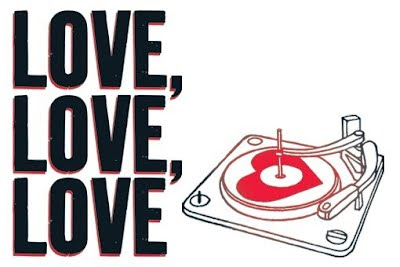Written for Culture Wars
Mike Bartlett takes his title from a Beatles song, but his play is best characterised by another: I Wanna Hold Your Hand. Bartlett wants to tell us something and he makes damn sure we’ll understand.
Eighteen months have passed since Love Love Love premiered at the Manchester Royal Exchange and Bartlett’s central argument – an almighty cry of j’accuse towards the baby-boomers that sought to change the world and, instead, sold it out – has become pretty much an accepted truism.
Given that Bartlett must have started writing a fair whack earlier, it’s hard to fault him for popular opinion catching up. In fact, he was among the first playwrights to raise the topic.
However, there’s something rather limp about it’s appearance at the Royal Court now. In last week’s Sunday Times, Dominic Cooke justified his theatre against recent accusations that it has become a rather safe place in recent years. His argument (which you can find here if you can peak behind the paywall) looks a little like sleight of hand. In defence, he turns to plays like Jerusalem, Enron and Clybourne Park – none of which were deemed safe or took place in the last couple of years.
In the Sunday Times piece, Cooke writes: “At the Royal Court, we programme according to two criteria: the quality of the writing, and whether the play, in either form or content, breaks new ground.”
Love Love Love completely fails the second of these criteria. At least it does now, in 2012. It didn’t when it was written, but if ‘having broken new ground’ counts, then Cooke might as well just programme Look Back in Anger and Blasted on a loop. “When I programmed Butterworth’s as-yet-unfinished Jerusalem in late 2008, it seemed anything but safe,” Cooke continues. Surely he can’t say the same about Love Love Love?
Nonetheless, Bartlett’s writing is genuinely quality. It’s certainly enjoyable. Really enjoyable, in fact: funny; moving; cleverly plotted with rewarding payoffs and intriguing characters. It trades on the 7Up model (documentary not drink) and revisits its characters at definitive moments of their lives and we play spot the difference. It’s a story told partly through pop music, technology and fashion.
First we see a 19 year-old Kenneth (Ben Miles) in 1967, getting off with the girl – Sandra (Victoria Hamilton) – that his squarer brother has brought home. By Act 2 and 1990, they’ve had two teenage children, at least two affairs and, it seems, countless rows. Finally, 2011, Kenneth is divorced and retired. His son’s brain seems to have frazzled and his 37 year-old daughter demands that he buy her a house.
My problem, however, is that Bartlett achieves such rounded satisfaction by sanding down any unseemly edges. In doing so, he almost loses sight of the truth.
At one level, Bartlett’s writing is smart. He plants seeds and sows rewards with a careful pick-up or echo later on. Everywhere you turn there’s irony. While Ken lounges around on his student grant in 1967, his father “works like a dog.” By 2011, his daughter Rose, a musician, is earning a third as much as him, even after his retirement. There’s a satisfying neatness running throughout and James Grieve’s direction makes the utmost of it.
He’s also careful not to let anyone off the hook. Kenneth and Sandra, as the incriminated baby-boomers, bear the brunt, but their kids seem spoilt and incapable of looking after themselves. Rose castigates her parents for encouraging her into music. It looks brattish to curse such fortunes, but at 16 she was discounting music because “the pay’s really bad.”
Of course, as a 27 year-old aboard a similar ship, that looks to me like a case of nurture over nature, but it will doubtless give an older, more sympathetic audience a get-out clause. And they need one because Love Love Love’s central point, its social criticism, rings true to the point of rankling.
However, in trying to make a point, Bartlett has over-simplified. By boiling down a generation into individuals, not so much reflecting the shifting state of the nation and just plonking it onstage, he makes it easy for us and, worse than that, he writes history as the record books show it. Truthfulness is dropped for thesis and, satisfying though its neatness might be, Love Love Love always feels slogan-heavy and manipulative.
In fact, it gets Bartlett into trouble and he ends up with a 37 year old expressing problems more acutely felt by twenty-somethings. That neither George Rainsford nor Claire Foy look old enough suggests a production that’s trying to have it both ways. To get the ages right, however, would have required primary school children in Act 2, which presumably sit somewhere outside of either Rainsford or Foy’s range.
Grieve’s production is also guilty of patronising the past, by both opting for the worst sides of bygone fashions and over-played playing-down. Only Foy, invests a character significantly younger than herself with real credibility, playing the teenage Rosie as a mixture of incredibility and injustice. Elsewhere, Miles relies on a naïve, quavering tenor, Hamilton overdoes the wispy-voiced AQI and Rainsford giggles and huffs to play a 14 year old.
All this neatness is one thing with a fresh point to make and another when it ends up preaching to the converted. (Even when the converted are also the accused.) If we needed our hands held to grasp the point in 2010, in 2012, it suddenly feels terribly patronising. This is not Bartlett’s fault. In this instance, though it gives London the chance to see the play, Cooke has missed the boat. Today Love Love Love belongs in the West End and, as Dan Rebellato has already pointed out, it is directed as such. Contradictory though it may seem, it’s presence in Sloane Square is as damning of the commercial sector that failed to back it as of the Royal Court that stepped in to do just that.

0 comments:
Post a Comment